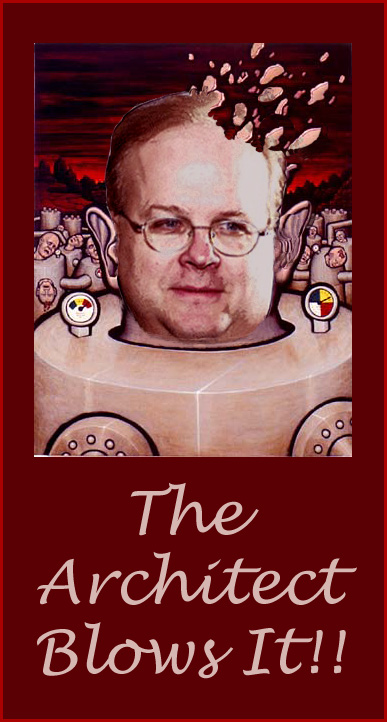Polispeak: November 2006: Archives
Senator John McCain continues to shift his positions in anticipation of his run for the GOP 2008 presidential nomination. Think Progress has the video of McCain's appearance this morning on This Week with George Stephanopoulos. In this particular appearance, McCain argues for the overturning of Roe v. Wade in order to give states the right to determine how they prefer to handle a woman’s right to choose. The subtle shift allows McCain to appeal to those conservatives who oppose abortion.
It seems to me that McCain is slowly walking away from his persona as a maverick with strong principles in order to better his chances to win. While I understand his desire to be president, he becomes less appealing each time he compromises to become a viable candidate. Frankly, I view his actions to be similar to the George Bush equation for gaining and holding power. If that observation is correct, then McCain, like so many others who seek power, is for sale. That's unfortunate.
Daniel DiRito | November 19, 2006 | 1:56 PM |
link
| Comments (0)



I'll admit that I have never been a big fan of Nancy Pelosi. During the campaign preceding the 2006 elections, I found her remarks in numerous interviews to lack certainty and her answers were filled with hesitancy...she just didn't seem to have a good handle on how the Democrats intended to proceed if they were to win control of the House or the Senate.
Notwithstanding, in the first few days after the election she seemed to have found her stride and I found myself reconsidering my view of the Speaker-to-be. Her statements were clear and I felt she was setting the right tone for the Democrats to position themselves as hard-working, roll up your sleeves public servants intent on bringing the changes that the election results clearly demanded.
Unfortunately, within another few days my opinion has changed once again as it now appears that Pelosi has found her way to the ever dangerous punch bowl that is filled with that magical potion called power...and her actions with regard to the selection of the House Majority Leader suggest that she has been over served. Let me be clear. I have no problem with Pelosi endorsing Murtha as a matter of loyalty...but she appears to be intent on making this leadership election her first foray into the politics of power. In my opinion, her actions in that regard are a mistake and they are apt to undo the goodwill she likely gained in the immediate aftermath of the midterm election.
As I browsed the news in the last couple days, there was ample evidence of the damage being done by this apparent effort to wield power. Pelosi's willingness to make an issue of Murtha's quest to become the Majority Leader is undermining her assurances to the American people that this 110th Congress would be about integrity and would begin the process of "draining the swamp". Take a look at what is being written about Murtha in the Washington Post and in the Opinion Journal.
From The Washington Post:
The videotape is grainy, dark and devastating. The congressman and the FBI undercover agents -- the congressman thinks they represent an Arab sheik willing to pay $50,000 to get immigration papers -- are talking business in the living room of a secretly wired Washington townhouse.
Two other congressmen in on the deal "do expect to be taken care of," the lawmaker says. But for the time being -- and he says repeatedly that he might change his mind and take money down the road -- he'd rather trade his help for investment in his district, maybe a hefty deposit in the bank of a political supporter who's done him favors.
"I'm not interested -- at this point," he says of the dangled bribe. "You know, we do business for a while, maybe I'll be interested, maybe I won't, you know." Indeed, he acknowledges, even though he needs to be careful -- "I expect to be in the [expletive] leadership of the House," he notes -- the money's awfully tempting. "It's hard for me to say, just the hell with it."
This is John Murtha, incoming House speaker Nancy Pelosi's choice to be her majority leader, snared but not charged in the Abscam probe in 1980. "The Democrats intend to lead the most honest, most open and most ethical Congress in history," Pelosi pledged on election night. Five days later she wrote Murtha a letter endorsing his bid to become her No. 2.
I don't dislike John Murtha. In fact, he was instrumental in steering the country towards a discussion about the benefits of a prolonged presence in Iraq without the potential for meaningful results. Nonetheless, his history as a Congressman who has played the margins with regards to influence peddling only serves to hurt Pelosi's credibility. That is not to say Murtha is guilty of any significant ethical offenses or that the opposition isn't exaggerating his questionable activities...but if Pelosi is as smart as many think she is this is one ill-chosen fight. Take a look at John Fund's efforts to spin the Murtha situation into a major issue.
From The Opinion Journal:
House Speaker-designate Nancy Pelosi's endorsement of Rep. John Murtha for majority leader, the No. 2 position in the Democratic leadership, has roiled her caucus. "She will ensure that they [Mr. Murtha and his allies] win. This is hardball politics," Rep. Jim Moran, a top Murtha ally, told the Hill, a congressional newspaper. "We are entering an era where when the speaker instructs you what to do, you do it."
But several members are privately aghast that Mr. Murtha, a pork-barreling opponent of most House ethics reforms, could become the second most visible symbol of the new Democratic rule. "We are supposed to change business as usual, not put the fox in charge of the henhouse," one Democratic member told me. "It's not just the Abscam scandal of the 1980s that he barely dodged, he's a disaster waiting to happen because of his current behavior," another told me.
Melanie Sloan, the liberal head of Citizens for Responsibility and Ethics in Washington, was cheered on by Democrats six weeks ago when she helped reveal the Mark Foley scandal. Now she says that "Ms. Pelosi’s endorsement of Rep. Murtha, one of the most unethical members of Congress, show that she may have prioritized ethics reform merely to win votes with no real commitment to changing the culture of corruption."
In contrast to Sen. John McCain, whose experience in the 1990 Keating Five scandal turned him into a good-government reformer, Mr. Murtha's brush with infamy stirred in him a conviction that members of Congress deserve more protection from ethics probes. In 1997 Mr. Murtha joined with Rep. Billy Tauzin, a Louisiana Republican, in blocking outside groups and private citizens from filing complaints directly with the House Ethics Committee.
Mr. Murtha also pushed for a law that would require the Justice Department to reimburse the legal bills of any member of Congress it investigated if it was shown the probe was not "substantially justified"--a privilege no other American enjoyed. Only after Henry Hyde, then chairman of the Judiciary Committee objected was the bill amended to allow reimbursement for anyone--member of Congress or not--acquitted in a "bad faith" prosecution.
Gary Ruskin, director of the liberal Congressional Accountability Project, told Roll Call that "when it comes to institutional policing of corruption in Congress, John Murtha is a one-man wrecking crew." Now with the support of Ms. Pelosi, that "wrecking crew" stands just one ballot away from becoming House majority leader. Should he win the sealed-ballot election of his peers tomorrow, Democrats may have a hard time explaining just what has changed regarding the Congress's "culture of corruption."
I just don't get it. Many have said that Pelosi is a very loyal person and John Murtha has proven his loyalty to Pelosi in the past and that required she reciprocate. I'm sorry but we just concluded an election that repudiated a President who many Democrats said was blindly loyal to numerous incompetent and wrong thinking associates. Why would Nancy Pelosi make her first act a carbon copy of all that Democrats found wrong with a circle-the-wagons presidency? Even if one sets aside the loyalty factor it would be difficult to understand the benefits of Pelosi drawing a line in the sand on Murtha being the Majority Leader.
Given that many Pelosi detractors argue that she is to the far left ideologically, the Murtha endorsement is being used to portray her as adamant that we withdraw from Iraq as soon as possible without consideration for the risks to our national security. The fact that Pelosi doesn't intend to appoint Jane Harmon to chair the House Intelligence Committee further supports that contention. I am not suggesting that I agree with those who seek to paint Pelosi as an anti-war liberal...I am merely pointing out that her actions may be used to advance that assertion.
There is no doubt that every move made by Pelosi will garner scrutiny and the GOP will seek to discredit her and the Democrats at every turn. With that said, it is imperative that Pelosi and the Democrats avoid providing the opposition with the fodder to fuel such efforts. I don't know definitively why Pelosi has chosen to engage in a very public power struggle so early into her leadership role...but it doesn't do much to advance the agenda she and the Democrats have indicated they will pursue. While she hasn't asked for my advice, I would simply suggest that Nancy Pelosi step away from the punch bowl.
Daniel DiRito | November 15, 2006 | 8:18 AM |
link
| Comments (0)


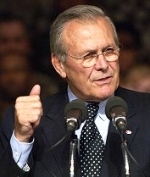
The Associated Press is reporting that Secretary of Defense Donald Rumsfeld will resign and that Robert Gates, former head of the Central Intelligence Agency. Gates served under the first President George H. W. Bush and there are indications that the appointment will signal a new direction in the management of the Pentagon and the war effort in Iraq.
While I doubt it would happen, it crossed my mind that the powers that be in the GOP might think that it would also be beneficial to have Vice President Cheney resign as well. Again, I think it is highly unlikely, but one could argue that it would give the GOP an opportunity to position a Republican candidate for the 2008 presidential election. Cheney could use his health as the rationale for a resignation but if that were to be the decision, it wouldn't likely happen immediately...but at some point not too far down the road.
Thought Theater previously argued that it would serve the Democrats best if Donald Rumsfeld continued as Secretary of Defense until the 2006 midterm election. Clearly, the President's calculation to express his support for Rumsfeld just prior to the election may have been a deciding factor in the strong statement of dissatisfaction by voters. I can't help but wonder if the coming Democratic oversight may have been an element of this decision. Many have felt that the Bush administration has been able to avoid much needed scrutiny while the GOP held control of the House and the Senate. That is likely to change in the coming days.
Daniel DiRito | November 8, 2006 | 10:57 AM |
link
| Comments (0)


Daniel DiRito | November 8, 2006 | 10:22 AM |
link
| Comments (1)


This posting will be the first posting on the site until tomorrow. New postings between now and then will appear following this one in typical time sequencing. Be sure to scroll down if you're looking to read or view any new postings.
The following graphic will track the balance of power in the House. As seats switch parties, I will update the graphic to show the seat and the party that has won the seat. I will also show the net number of seats each party has gained or lost at the bottom of the graphic. Once the results are all in, the number at the bottom of the graphic will reflect the actual total number of seats held by each party.
Currently, one seat is held by an independent so I have not included that seat in the starting number of seats held by each party. As a reminder, the Democrats need to pick up a total of 15 seats to gain control of the House. Let me offer some words of caution. I expect results sites to have difficulty staying on-line tonight (some of them are bound to crash) as viewers flood those sites. I have tried to establish multiple sources of results but that is not a guarantee I will be able to access them as timely as I would prefer. I'll post any relevant updates above the graphic as needed.
Daniel DiRito | November 7, 2006 | 6:40 PM |
link
| Comments (1)


Regarding the Senate, I will be posting the winner in the races that are considered pivotal to majority control. Those races include Pennsylvania, Ohio, New Jersey, Rhode Island, Maryland, Missouri, Montana, Tennessee, and Virginia.
Bob Casey (D) - Pennsylvania
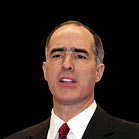
Bob Menendez (D) - New Jersey
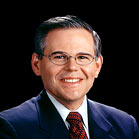
Sherrod Brown (D) - Ohio
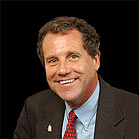
Ben Cardin (D) - Maryland

Sheldon Whitehouse (D) - Rhode Island

Bob Corker (Rep) - Tennessee
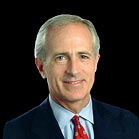
Claire McCaskill (D) - Missouri

Jim Webb (D) - Leads in Virginia (Subject to some outstanding ballots, verification, and possible recount)
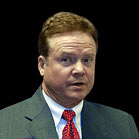
Jon Tester (D) - Leads in Montana (Subject to some outstanding ballots, verification, and possible recount)
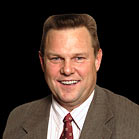
Daniel DiRito | November 7, 2006 | 6:29 PM |
link
| Comments (0)


As we await the returns on this Election Day, this may be the most watched election in recent history...and most of those watchers don't even live here in the United States. Howard Fineman provides his thoughts on the topic in a new article that can be found online at Newsweek. From my own perspective, when I traveled around the world just after the 2004 reelection of George Bush, it was clear to me that many foreigners didn't understand the outcome of the election. Many of those I encountered wondered if they no longer understood the American mindset and the American people. Many times I was asked if most Americans actually supported the policies of President Bush.
Keep in mind that the view of America in the rest of the world focuses primarily on our foreign policy; making it more difficult for foreigners to understand the impact that our left / right divide may have on elections. In other words, we may understand the nuances of our "culture war" and how that plays into voter decisions but the vast majority of outsiders can't relate to that dynamic...especially in Europe where they typically draw a more distinct divide between church and state. That makes today's election all the more significant.
Do we believe in the president’s war in Iraq, or not? The world wants to know. It will react accordingly.
Our elections have never really been our own; the world always has sought lessons and leverage here. That is even more the case now, in the aftermath of 9/11, in the midst of what some call the “clash of civilizations," at a time when capital, data and ideas flow across what used to be borders. We invented the idea that public opinion governs. The way we conduct our elections, and the outcomes of them, matters to the world helped bring into being.
Do Americans care what the rest of the world thinks of us? Even if they do, will that influence how we vote? Talking to voters this year I was struck by the extent to which they were thinking in global terms—about terrorism, trade, the planetary environment, music and culture.
In the absence of another idea, most Americans accepted the Texan president’s “One Riot, One Ranger" theory of “taking the war to the terrorists," even, if not especially, in Iraq.
But there have been costs, and the American people are beginning to do the worldwide strategic and ethical math.
Voters are angry about the loss of American life and treasure, but many of them also worry about whether we are losing something just as precious, and as critical to our security: our sense of commanding moral mission in the world.
My own experience tells me that much of the world will view this election as an opportunity for Americans to reiterate their sense of decency and their prevailing desire to act as an impartial and influential force for peace and stability throughout the world. Let me be clear so as to avoid giving the impression that the rest of the world is made up of pacifists who would oppose the use of force under any circumstance. That's not the case and a number of those I spoke with indicated that they understood our invasion of Afghanistan and they supported that effort to extinguish those terrorists responsible for 9/11.
However, the invasion of Iraq never met with the favor of many foreigners...even though some of their governments supported the American invasion. That opposition has continued to grow as the reasons for the war in Iraq have continued to evolve (viewed by many as rationalizations) while the outcome continues to deteriorate. The following photos are from late 2004 and early 2005 and they demonstrate the level of opposition to the war nearly two years ago. It’s hard to imagine that this disfavor hasn't accelerated.
I think the above pictures give readers a sense of the opposition to the war in Iraq and what many viewed as unwarranted American aggression. Again, I want to be careful to not portray the rest of the world as pro-terrorist...they aren't and they fully accept that the U.S. has every right to pursue those responsible for 9/11. The many people I met had great sympathy for America's loss but they simply couldn't connect that loss with the necessity to invade Iraq.
I tend to agree with the following conclusion from Fineman in that I doubt there will be any simple solution to the mess in Iraq. That presents numerous problems. One, those voters and observers that may see a Democratic victory as a sign that change is coming will have high expectations. Two, once we face the mess in Iraq absent its partisan benefit, the solutions will be difficult and the outcome from any chosen course will likely be less than perfect...far less...and that may hold true for Iraq, for America, for U.S. voters, and for the rest of the world.
While I'm hoping for a Democratic victory today, I expect that tomorrow will require an abundance of hope that all those politicians in positions of power will find the will and the way to take decisive actions and lead us past this dangerous and complex juncture. The whole world will be watching.
Some analysts have argued that the vote today is not and cannot be interpreted as a referendum on Iraq. The polls show otherwise: it is the number one issue on the minds of the voters. Other analysts suggest that, even if Democrats take back the Congress, little will change in terms of Iraq policy. There will be no “cut and run" regardless—no immediate cut off of funding, no decision to set a firm timetable. So the theory goes: nothing changes.
I don’t buy any of that. If the Democrats win big, the world will assume that our policy will change somehow. No “cut and run," former President Bill Clinton said on the campaign trail, but “stop and think."
I would tell the Democrats: be careful what you wish for. The world will cheer your arrival, and then you will not only have to “stop and think," you will have to think and act.
Daniel DiRito | November 7, 2006 | 11:27 AM |
link
| Comments (0)


Daniel DiRito | November 6, 2006 | 5:08 PM |
link
| Comments (0)



The GOP has added robocalling to their final get out the vote / suppress the vote effort in a number of Congressional districts. The gist of robocalling is to make repeated calls to voters at annoying times and with outrageous messages that appear to be from the Democratic Party or the Democratic candidate. They are lengthy messages that frequently lead those receiving the call to hang up after hearing the inference that the call is coming from a Democrat and before hearing that the Republican Party sponsored the calls. John Cole at Balloon Juice provides the following advice:
When you get a call, do this:
Record the call, making sure that you get the end where the RNC announces its sponsorship.
Record the phone number.
Make sure that Metro desks at your local newspaper, TV stations and radio stations hear about it. If you know anybody who has also received the calls, have them call in as well.
Contact Josh Marshall with the details and the phone number, especially if you live in a state not listed above.
Tell EVERYBODY you know. The only thing that will kill this is word of mouth. In fact, outrage about this behavior (interrupting people repeatedly during dinner, waking them up repeatedly at ridiculous hours) should spark a major backlash. But that will only happen if people know about it, so start calling around now.
Again, if you know anybody who woke up at 3 AM to take an irritating automated phone call make sure he or she knows that the call came straight from Ken Mehlman at the RNC. Let’s help revolting behavior get the reward it deserves.
We now know that the bogus robocalls are a single coordinated campaign targeting fifteen races: CA-04, CA-50, CT-04, CT-05, FL-13, ID-01, IL-06, IL-08, KS-02, NC-11, NH-02, NY-19, PA-06, WA-05. If you know of any more please leave the information in the comments.
A more thorough list of targeted races at TPM. The perpetrator is definitely Conquest Communications of Richmond, Virginia.
This is one of many tactics employed by the GOP at the last minute to create confusion and to impact voter turnout. The RNC amassed a huge cash advantage over the DNC for this very type of last minute campaigning. Rather than have their candidates debate the issues, they have encouraged them to distance themselves from the President if necessary while at the same time the RNC will fund efforts like this to discredit their opponents. One would expect nothing less from the values party!
Daniel DiRito | November 6, 2006 | 4:32 PM |
link
| Comments (0)



As expected, there has been a barrage of polls in the last few days. While it is impossible to determine what the final outcome will be on Tuesday night, I think it warrants a look at the polls to see if anything can be gleaned. The following is a list of those polls, the dates they were taken, the numbers on the generic congressional question, and the margin of error. Following the list of polls is my attempt to decipher the meaning of these polls and my own offering of some plausible and possible explanations...including commentary on some of the individual Senate contests.
Time Poll:
Conducted: November 1st through 3rd.
Margin of error: 3 percent
Generic Ballot: Democratic candidate: 55 percent; Republican candidate: 40 percent
Newsweek Poll:
Conducted: November 2nd through 3rd.
Margin of error: 3 percent
Generic Ballot: Democratic candidate: 54 percent; Republican candidate: 38 percent
Pew Research Center Poll:
Conducted: November 1st through 4th.
Margin of error: 3 percent
Generic Ballot: Democratic candidate: 48 percent registered, 47 likely; Republican candidate: 40 percent registered, 43 likely
Washington Post - ABC News Poll:
Conducted: November 1st through 4th.
Margin of error: 3 percent
Generic Ballot: Democratic candidate: 53 percent registered, 51 likely; Republican candidate: 43 percent registered, 45 likely
USA TODAY / Gallup Poll:
Conducted: November 2nd through 5th.
Margin of error: 3 percent
Generic Ballot: Democratic candidate: 51 percent registered, 51 likely; Republican candidate: 40 percent registered, 44 likely
CNN Poll:
Conducted: November 3rd through 5th.
Margin of error: 3 percent
Generic Ballot: Democratic candidate: 58 percent likely; Republican candidate: 38 percent likely
FOX News Poll:
Conducted: November 4th through 5th.
Margin of error: 3 percent
Generic Ballot: Democratic candidate: 49 percent likely; Republican candidate: 36 percent
As I review the data, it seems particularly important to look at the dates the polls were conducted given the recent events that may have had an impact on the numbers. The Times, Newsweek, Pew, and Washington Post polls were all completed no later than November 3rd or 4th indicating that they would have recorded some of the impact of the John Kerry remarks and the associated media attention the story received. In these four polls the average on the generic ballot (using likely voters where available) was 51.75 percent for the Democratic candidate and 41.5 percent for the Republican candidate.
The USA TODAY, CNN, and FOX polls were all conducted to include voter data from November 5th and only the USA TODAY poll included data from November 2nd. Note that the USA TODAY poll has the narrowest margin on the generic ballot of likely voters...which one could argue partially reflects the momentary impact of the Kerry story. In these three polls the average on the generic ballot (using likely where available) was 52.67 percent for the Democratic candidate and 39.33 percent for the Republican candidate.
While I'm not an expert on polling, my understanding is that it takes at least a couple days for current issues to be reflected in a poll. If you look at the Kerry incident, it made its way into the media on Tuesday, October 31st and it remained a topic through the Thursday November 2nd cycle. The Ted Haggard scandal first hit the media on Thursday November 2nd and remained a topic through Sunday November 5th. When looking at these dates in relation to the dates of these surveys, there is obviously a degree of overlap and an imperfect division relative to these two media blockbusters. Nonetheless, the polling results seem to reflect the impact of the two issues whereby the first four polls show a larger slippage of Democratic support while the final three polls suggest a greater slippage for the GOP.
As I attempt to make sense of the numbers, my first inclination is to surmise that the two issues are virtually offsetting. The first four polls reflect some skewing towards the GOP and the latter three polls (particularly the final two) suggest a skewing towards the Democrats. So where does that actually leave us with regards to voter sentiment and the final numbers in tomorrows election?
My own speculation is that the race isn't as close as the first four polls indicate but the Democratic advantage isn't as large as the final three polls would suggest. I've always suspected some narrowing of the Democratic lead as unsatisfied Republicans come to the conclusion that they will hold their nose and support the GOP candidate...primarily based upon fears that Democratic control of the Senate might jeopardize future Supreme Court appointments...which better explains the close Senate races in contrast to the growing evidence of Democratic strength in House races.
I can't recall a time when concerns about the make up of the Supreme Court were more prevalent and I cannot find a better explanation for the disparate polling information that seems to show Democrats doing very well in contested House races while the Senate races seem to be tightening...and some of these Senate races actually appear to be trending Republican. Supporting the possibility that the Supreme Court consideration can explain voter differences between the House and Senate races would be the argument that there is clear voter opposition to the war in Iraq and a desire to impose some accountability on the Bush administration...and that would be in the form of a Democratic House.
Historically, in elections where the House switches control from one party to the other, the Senate also follows suit. Current polling in the individual Senate races seems to indicate that this election could defy that historical trend. I would argue that this may well happen based upon voter concerns about Supreme Court appointments which may lead enough swing voters to vote against their GOP House candidate while still supporting their GOP Senate candidate.
After all, it is the Senate that must approve Supreme Court appointments and voters may still favor conservative appointments...especially if one considers the opposition to same-sex marriage and a general belief that the Democratic Party is against any limitations on abortion rights. In other words, if voters want their unhappiness with the war in Iraq to be heard while still endorsing the social issues they seem to favor, the best solution would be to elect a Democratic House and maintain a Republican Senate.
When looking at individual Senate races, there are some factors that could override the above considerations. Lincoln Chaffee is a moderate which could play both ways in a predominantly Democratic state and may take Rhode Island out of the Senate equation I'm proposing.
In Missouri, the stem cell issue could also change the above equation as stem cell research seems to be favored by a majority of voters. The fact that this race has remained a virtual tie for weeks would seem to indicate just how torn voters may be on this particular race and the impact their votes may have on these underlying factors.
In Montana, Conrad Burns has a cloud of corruption hanging over his head in a predominantly Republican state that is likely opposed to late-term abortion and same-sex marriage. The fact that Tester has led in this race would suggest that the corruption issue is hurting Burns. Nonetheless, the recent surge by Burns may be an indication that voters are afraid to elect a Democrat (even though he indicates he is a social conservative) who will likely be pressured to vote with his Party on the big social issues.
Virginia seems to be self explanatory. Webb is a former Republican and Allen has made numerous mistakes. Again, this race is too close to call and one that may fail to fit the model I've proposed. Regarding Maryland, Pennsylvania, Ohio, New Jersey, and Tennessee, it seems to me that local factors and prevailing political affiliations may overwhelm any of the considerations I've defined herein.
With that said, voters will soon have the last word. It will be fascinating to dissect the results.
Daniel DiRito | November 6, 2006 | 10:05 AM |
link
| Comments (0)



Every election cycle the media scrambles to quickly characterize and define what the results actually mean and what message has been given by the voters. This election will be no different though it may turn out that voters have delivered a far more complex message and one that may demonstrate their acumen to discern fact from fiction as well as their prevailing commitment to moderation. A new Los Angeles Times article speculates that this election may turn out to be about the voters in the center having their say.
WASHINGTON — In American politics, this might be the year that the center strikes back.
For six years, President Bush and the Republican congressional majority have governed behind a distinctive political strategy that focuses on mobilizing their hard-core supporters with an aggressively conservative agenda, even at the price of straining relations with moderate and independent swing voters.
Indeed, key GOP strategists argue that in this polarized political era, so many Americans have hardened in their loyalty to one of the two major parties that hardly any swing voters still exist.
But this year it appears that reports of the death of the swing voter are premature.
In races in virtually every corner of the country, key Republican House, Senate and gubernatorial candidates are facing imposing, sometimes cavernous deficits in the traditional center of the electorate, among voters who describe themselves as independents and moderates.
If that trend holds through Tuesday, it may not only sweep Democrats into control of one or both chambers of Congress, but could also ignite a debate in Republican ranks over the continuing viability of the base-centered strategy devised by Bush and key advisors such as Karl Rove.
"You can make a more realistic assessment of this when you see where the losses are, but [the message] is going to be that swing voters still count, and sometimes the more you cater to your base, the more you turn off swing voters," said Rep. Thomas M. Davis III (R-Va.), former chairman of the National Republican Congressional Committee.
Stanley B. Greenberg, a veteran Democratic strategist who dueled with Bush's team in 2000 and 2004, is even more emphatic: If the election results follow the trajectory of the latest polls, he says, "I think their whole model is going to lay shattered in pieces."
As I ponder this midterm election, my own observation is that most Americans anticipate the partisanship in politics…but they also prefer that governance should be about resolving issues that have the interest of all Americans at their core. For the duration of the Bush administration, that has not been the case. Initially, I suspect that many voters were willing to play ball because they generally supported the President's positions on what have been described as wedge issues...which I think are better defined as values issues.
I think it worked because America has long been influenced by strong religious beliefs. Initially, the Bush administration's approach seemed appealing to voters as it appeared to mirror their basic values. Further, the Bush administration did a good job of defining its opponents as anti-family, anti-values, and anti-religion elitists. At the same time, most people want validation of their basic core beliefs and the more absolute that is the better they feel...but that can also backfire. In that regard, situations like Enron, Katrina, the Abramoff scandal, the Mark Foley scandal, and now the Ted Haggard scandal create anxiety for good people. These kind of events force many voters (not all) to broaden their view and to reevaluate both the motivations behind the political process (the pursuit of power) and the prudence of seeking to impose values as opposed to the need to focus on living them.
I think the agenda offered and the image portrayed by the Bush administration satisfied for many what exists in us all...it offered the tidiness of a fairy tale and the satisfaction that comes with believing one is on the correct side of right and wrong and that that equation is black and white. We're all vulnerable to the lure and the luster of that scenario...though we almost always find that it is an illusion and that life is far more complicated and requires far more reflection.
"A huge part of my strategy has been to work on expanding the party," Mehlman said, through systematic outreach to Latinos and African Americans, and the use of advanced "micro-targeting" technology to find GOP-leaning voters in predominantly Democratic communities.
But for years, Rove and his top lieutenants have touted their belief that in this highly polarized era, fewer than 1 in 10 voters still swing in their allegiance between the parties from election to election. One of their key assumptions has been that the vast majority of voters who call themselves independents actually vote like reliable Democrats or Republicans, though they don't accept the label.
Those conclusions led the White House, in the reversal of the usual practice, to direct more of its campaign spending in 2004 toward mobilizing the Republican base than converting swing voters. It also reinforced Bush's inclination to pursue an ambitious conservative agenda at home and abroad that largely unified rank-and-file and congressional Republicans in support but generated near lock-step opposition from Democrats.
But this year, it appears that less of the electorate is permanently locked down than the White House theories projected. With Bush's approval rating among independent voters below 30%, polls in every region of the country show independents, who made up about a quarter of the vote in each of the last two elections, moving sharply against Republican candidates.
The belief that swing voters are virtually extinct "has led to a lot of President Bush's problems," said Democratic pollster Geoff Garin. "Because what it leads you to do is blow off the middle [in your decisions] and only worry about the base. And there are lots of voters who seem very inclined to punish President Bush in this election for behaving that way."
The error in the Bush / Rove calculation is to believe that people will remain at the extremes. Yes, there are those who will always be extreme...the bell curve proves as much...as does human nature. Notwithstanding, there exists a self-moderating nature within most people and when they perceive themselves to be too extreme they will eventually make an adjustment...even if it requires settling for less than the whole pie. In the end, I believe that means that any coalition that is created by an assemblage based upon rhetoric that is predominantly extreme cannot be sustained over time. Further, in order to create such a majority coalition requires a false message that also cannot be sustained.
One might equate it with having a football team made up of over forty players like Terrell Owens. It looks like a winning team, it offers the promise of victory, but in the end it fails because a team made up of only people at the extreme eventually succumbs to division when the players are all unable to satisfy their very narrow and uncompromising demands. Two truths exist to undermine this Bush / Rove strategy. One, the coalition will never be made up of individuals that are all as extreme as Terrell Owens so it isn't an unwavering coalition and differences will eventually be exposed. Two, it is impossible to satisfy the needs and demands of a coalition based solely upon extremist rhetoric...someone will eventually demand more tangible results than can be delivered or that will seem to be unreasonable to some members of the coalition.
In the 2002 congressional contests, postelection surveys showed that Republicans ran even with independent voters. In 2004, Bush lost them narrowly to the Democratic nominee, Sen. John F. Kerry.
But this year, in contests as diverse as the gubernatorial races in Colorado and Michigan, the Senate race in Pennsylvania, the highly contested House race between Rep. Heather A. Wilson (R-N.M.) and New Mexico Atty. Gen. Patricia Madrid, and open Republican-held House seats in Arizona and Colorado, polls last week showed Democrats leading among independents by at least 20 percentage points.
In a compilation of more than 41,000 automated survey interviews conducted last week in competitive congressional districts from coast to coast, the nonpartisan Majority Watch project found that independents preferred Democratic candidates over Republicans by 52% to 39%.
If Bush generates a surge of GOP turnout that enables Republicans to do better than expected Tuesday, his base-oriented approach could solidify its dominance in the party.
Big Democratic gains, on the other hand, would likely be prelude to the most open questioning of Bush's governing and political strategy that the president has faced since taking office.
"You want to be able to mobilize your base without alienating independents," said one senior House Republican, who asked for anonymity when expressing doubts about White House strategy. "We've been able to do the first; I'm not convinced we have been able to do the second. And that could be a very dangerous thing come Tuesday night."
They say that time is the great equalizer and it seems that this midterm election may well prove that point. I'm reminded of an Italian saying that was spoken many times in my family..."You have to eat a hundred pounds of salt with someone before you will ever know them". I think this 2006 midterm election may tell us that voters have eaten enough salt to know that they can no longer embrace the Bush administration and the politics of division.
I find Karl Rove to be a fascinating figure...primarily because he has sought to manipulate voter psychology. Frankly, he's been pretty successful in his efforts and that is noteworthy. Unfortunately, he seems to have forgotten the fundamental principle behind the practice of psychology. It is possible to obtain power over people if one is so inclined...but it can only be sustained through persuasion. Karl Rove attained the power that he and the President sought, but it seems that they are about to lose it because once they held power, they seemed comfortable to abandon the need to be persuasive.
In the end, history may be unkind to Karl Rove. When I recall the famous Lincoln quote, "You can fool some of the people all of the time...and all of the people some of the time...but you can't fool all of the people all of the time", it looks like Karl Rove's thought he could apply this same principle to only fifty one percent of the voting public and still succeed. Rove recently stated that he wasn't concerned about the poll numbers being reported in the media and asserted that he actually had "THE numbers" that mattered. I could be wrong, but if "The Architect" built his house with this math, it may not weather the wave that looks to be headed his way.
Daniel DiRito | November 5, 2006 | 9:25 AM |
link
| Comments (0)



The war in Iraq has been the albatross around the Bush administrations neck for some time now. Last week, the President reaffirmed his support for Secretary of Defense Donald Rumsfeld and Vice President Cheney. Today we find out that four leading military newspapers will call for the resignation of Rumsfeld just days before an election that is seen to be largely about the war in Iraq and a referendum on the Bush administration handling of the war. That would suggest that things have gone from bad to worse.
An editorial set to appear on Monday -- election eve -- in the four leading newspapers for the military calls for the resignation of Secretary of Defense Donald Rumsfeld.
The papers are the Army Times, Air Force Times, Navy Times and Marine Corps Times. They are published by the Military Times Media Group, a subsidiary of Gannett Co., Inc. President Bush said this week that he wanted Rumsfeld to serve out the next two years.
"We say that Rumsfeld must be replaced," Alex Neill, the managing editor of the Army Times, told The Virginian-Pilot Friday night. “Given the state of affairs with Iraq and the military right now, we think it’s a good time for new leadership there."
In early September Thought Theater argued that it would be better for the Democrats if Rumsfeld remained in his position until after the election because it would simply demonstrate the intransigence of the President to consider a new strategy for the war in Iraq. In the end, I would argue that the administration was between a rock and a hard place. They didn't want the firing of Rumsfeld to signal to voters that the execution of the war had been a failure and on the other hand they ran the risk of appearing to be tone deaf to the prevailing voter sentiment that the war was being mismanaged. Frankly, the administration's tough guy approach to politics put them in this predicament because they continued to defend the handling of the war when it was evident to any reasonable observer that our efforts in Iraq were not succeeding.
The timing of the editorial was coincidental, Neill said. But he added, "President Bush came out and said that Donald Rumsfeld is in for the duration … so it’s just a timely issue for us. And our position is that it is not the best course for the military" for Rumsfeld to remain the Pentagon chief.
Neill said he was uncertain how troops will react. “I think we’ll hear from both sides," he said. “It will be interesting to find out if it swings significantly one way or the other."
Again, many political observers were shocked that the President would offer an endorsement of Secretary Rumsfeld so close to the midterm eleciton. As it now turns out, it may have facilitated this editorial and brought more focus to the war in Iraq at perhaps the most inopportune time. The following are excerpts from the actual editorial.
"So long as our government requires the backing of an aroused and informed public opinion ... it is necessary to tell the hard bruising truth."
That statement was written by Pulitzer Prize-winning war correspondent Marguerite Higgins more than a half-century ago during the Korean War.
But until recently, the "hard bruising" truth about the Iraq war has been difficult to come by from leaders in Washington. One rosy reassurance after another has been handed down by President Bush, Vice President Cheney and Defense Secretary Donald Rumsfeld: "mission accomplished," the insurgency is "in its last throes," and "back off," we know what we're doing, are a few choice examples.
Military leaders generally toed the line, although a few retired generals eventually spoke out from the safety of the sidelines, inciting criticism equally from anti-war types, who thought they should have spoken out while still in uniform, and pro-war foes, who thought the generals should have kept their critiques behind closed doors.
Now, however, a new chorus of criticism is beginning to resonate. Active-duty military leaders are starting to voice misgivings about the war's planning, execution and dimming prospects for success.
Army Gen. John Abizaid, chief of U.S. Central Command, told a Senate Armed Services Committee in September: "I believe that the sectarian violence is probably as bad as I've seen it ... and that if not stopped, it is possible that Iraq could move towards civil war."
[...] For two years, American sergeants, captains and majors training the Iraqis have told their bosses that Iraqi troops have no sense of national identity, are only in it for the money, don't show up for duty and cannot sustain themselves.
Meanwhile, colonels and generals have asked their bosses for more troops. Service chiefs have asked for more money.
And all along, Rumsfeld has assured us that things are well in hand.
Now, the president says he'll stick with Rumsfeld for the balance of his term in the White House.
This is a mistake.
[...] Rumsfeld has lost credibility with the uniformed leadership, with the troops, with Congress and with the public at large. His strategy has failed, and his ability to lead is compromised. And although the blame for our failures in Iraq rests with the secretary, it will be the troops who bear its brunt.
This is not about the midterm elections. Regardless of which party wins Nov. 7, the time has come, Mr. President, to face the hard bruising truth:
Donald Rumsfeld must go.
I'm still puzzled as to why the Bush administration has failed to focus its midterm message more on the war on terror and less on the war in Iraq. Prior to the Mark Foley scandal it appeared that the GOP was having some success with that message but since that time, the President has redirected his comments and attention to the war in Iraq. While we will probably never know the reasoning behind this apparent shift, one might speculate that this President simply cannot accept or acknowledge mistakes and when he was confronted by the release of the classified NIE assessment and gloomy reports from Iraq, he did what he always does...defend and deny. It now appears that voters are poised to offer their own candid response...enough is enough.
Daniel DiRito | November 4, 2006 | 10:03 AM |
link
| Comments (0)


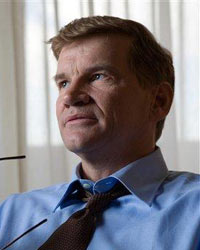
From KUSA Channel 9 in Denver, we have the following update on the allegations that Ted Haggard, the president of the National Association of Evangelicals had a "sexual business" relationship with a gay male escort. I've posted the entire article but it can be found here.
DENVER - A nationally known voice recognition expert says he believes voice mails left for a male escort are from a pastor in Colorado Springs.
Mike Jones, a gay man and admitted male escort, claims he and Pastor Ted Haggard have been having a "sexual business" relationship for the past three years.
He also claims Haggard used methamphetamine in his presence several times.
Haggard denies the accusations.
Thursday, Haggard took a leave of absence from the New Life Church and resigned as president of the multi-million member National Association of Evangelicals.
Jones provided two voice messages to 9NEWS he claims are Haggard calling him.
The voice mails for from a man who calls himself "Art."
It should be noted Haggard's middle name is Arthur.
The first voice message, left on August 4 at 2:18 p.m., says:
"Hi Mike, this is Art. Hey, I was just calling to see if we could get any more. Either $100 or $200 supply. And I could pick it up really anytime I could get it tomorrow or we could wait till next week sometime and so I also wanted to get your address. I could send you some money for inventory but that's probably not working, so if you have it then go ahead and get what you can and I may buzz up there later today, but I doubt your schedule would allow that unless you have some in the house. Okay, I'll check in with you later. Thanks a lot, bye."
The second voice message, left on August 4 at 5:10 p.m., says:
"Hi Mike, this is Art, I am here in Denver and sorry that I missed you. But as I said, if you want to go ahead and get the stuff, then that would be great. And I'll get it sometime next week or the week after or whenever. I will call though you early next week to see what's most convenient for you. Okay? Thanks a lot, bye."
Jones claims Art is referring to methamphetamine in the messages.
9NEWS had a nationally known voice recognition expert, Richard Sanders, listen to the voice mails to determine if it is Haggard. Sanders has previously worked on such high profile cases as the Oklahoma City bombing trial, the Columbine High School shootings, the JonBenet Ramsey murder investigation, and the Kobe Bryant case.
"This certainly sounds like the same person," said Sanders, after listening to the voice mails.
In his final report, Sanders found that of 12 single words that were the same on both recordings, nine of those words were perfect matches. He also found that the entire phrase, "I don't know," was also a precise match.
Sanders makes his decision by comparing the resonance of the voice, the play of one's tongue and the inflection of vowel sounds.
"If we can find enough words and phrases that match then it's generally accepted by courts that that's the same person," he said.
Haggard told 9NEWS he is prepared for the outcome of the church's independent investigation.
After hearing about Haggard's resignation, Jones said, "I'm sad. I'm sad for him, but we do have consequences for our actions."
Haggard is the senior leader and founder of the New Life Church. It has 14,000 members and the church told 9NEWS that close to 2,000 of the members are junior high, high school and college students.
"I think the church and Christians have through very difficult times and this appears to be one of those," said James Groesbeck, a spiritual leader for the church.
Groesbeck says it was the right move for Haggard to step down. "If what's being said is true, then it's the responsible thing to do," he said.
Many members of the church reacted to the news with disbelief.
"There is no truth to this at all. I'm disappointed because I loved him as a senior pastor and it's just sad to see him move on like that," said Chris Herndon, a church member.
"He loves God, he loves his people, his wife, his family and he would never do anything like this," said Adrienne Simmonds, another church member.
Elders with the church held a meeting Thursday night to discuss the situation, but did not release any additional information to 9NEWS.
The following clip of Ted Haggard is from the documentary Jesus Camp.
UPDATE:
KKTV Channel 11 in Colorado Springs is reporting that Ted Haggard has admitted to some indiscretions.
A sudden about-face in the scandal facing New Life Church's pastor.
After Pastor Ted Haggard went public Wednesday night denying allegations of a homosexual affair, senior church officials told KKTV 11News Thursday evening, Pastor Ted Haggard has admitted to some of the claims made by a former male escort. The church's Acting Senior Pastor, Ross Parsley, tells KKTV 11 News that Pastor Haggard has admitted to some of the indiscretions claimed by Mike Jones, but not all of them.
Thursday morning, Jones went on a Denver radio talk show and said Pastor Haggard paid him for sex over the past 3 years. Jones also claims Haggard used drugs with him.
Right now, the situation is under investigation by an independent panel of leaders from four outside churches. The leaders are from Colorado Springs, Larkspur, Westminster and Louisiana. The panel's role is to decide if Haggard will be exonerated, released from his duties or restored to his pastorship.
Earlier Thursday, Haggard resigned as President of the National Association of Evangelicals, and placed himself on administrative leave as head of New Life Church. New Life Church has an estimated 14,000 members, while the NAE claims roughly 30 million members.
Daniel DiRito | November 2, 2006 | 11:51 PM |
link
| Comments (7)


I've long argued that most forms of extremism harkens back to one's own psychological issues. I'm reminded of the psychological theory that suggests that the psyche is similar to a tube of toothpaste. The gist of the argument is that a tube of toothpaste works well when the cap is removed and pressure is applied in order to push the paste from the container. However, if the cap is placed on the tube and the same pressure is applied, toothpaste will eventually ooze out from numerous newly created and unintended openings. The psyche functions similarly in that if we allow our identity to flow naturally and resist the societal pressure to "cap it" we function normally...but if we attempt to hide our identity...meaning to "cap it" in order to keep it hidden (whether that be from shame, fear, or some other factor)...it will escape and manifest itself in numerous dysfunctional behaviors.
Over the years, it seems to me that religion and religious service has served as one of the prevailing mechanisms for the capping of identity. Few are unaware of the Catholic Church's problem with the molestation of children by those within the ranks of its clergy. Numerous other religious types have fallen from grace when their actions have been exposed and therefore their demons revealed. Perhaps Jimmy Swaggert is one of the most notable given his meltdown after it was disclosed that he was hiring prostitutes for years. There are many others including Jim Bakker who found himself imprisoned and more recently we learned that Ralph Reed was closely tied to the Abramoff influence peddling scandal.
Today, we're learning about another possible scandal of monumental proportions. A Denver television station, KUSA Channel 9, reported last night on the accusation that Ted Haggard, the pastor of one of the countries largest mega-churches as well as the President of the National Association of Evangelicals, has conducted a three year "sexual business" relationship with a Denver homosexual male escort.
DENVER - A gay man and admitted male escort claims he has had an ongoing sexual relationship with a well-known Evangelical pastor from Colorado Springs.
Haggard is married with five children and an outspoken critic of gay marriage.
Jones broke his silence Wednesday morning on talk radio.
In an exclusive interview Wednesday night, Haggard denied the claims and told 9NEWS he is prepared for his own church to investigate them.
"I did not have a homosexual relationship with a man in Denver," said Haggard. "I am steady with my wife. I'm faithful to my wife."
Jones started talking to 9 Wants to Know two months ago. He claims Haggard has been paying him for sex over the past three years, even though Haggard preaches that homosexuality is a sin.
Jones also claims Haggard used methamphetamine in his presence on several occasions.
"People may look at me and think what I've done is immoral, but I think I had to do the moral thing in my mind and that is expose someone who is preaching one thing and doing the opposite behind everybody's back," said Jones.
Former NBC News anchor Tom Brokaw profiled Haggard in 2005 in a series on mega-churches. Haggard was also listed by Time magazine as one of the 25 most influential Evangelicals in America last year.
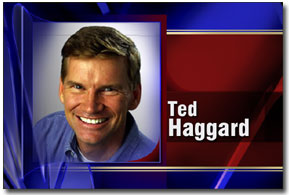

While one cannot conclude that this accusation will prove to be true, the man bringing the allegation has been in the Denver and Colorado Springs area for some time. His advertisements for services have appeared in local gay publications for a number of years and it wouldn't make a lot of sense for him to come forward without sufficient and accurate information to prove his claims. That is simply speculation on my part but it would seem like a huge mistake if his story is a fabrication. My hunch is that the information will bear the coming scrutiny and that the pastor's secrets are about to be exposed.
I'm going to say some things now that may anger a number of people...but I'm doing so because I think its important if we are ever going to get past the prejudice and the bigotry that surrounds us each day. People of faith are being manipulated by people who seek power. Fear and hatred are very powerful tools and many of those who hold themselves up as religious leaders have simply realized as much. We all have a tendency to seek confirmation of our beliefs and nothing is more satisfying than having that confirmation be as absolute as possible. Religion has long been the means to that end.
I remember something my grandmother used to say when anyone sought to sing the praises of the church...she said the person behind that pulpit is no different that any other man or woman...they are human and that means they are flawed and they don't have the ability to know more nor do they know more than anyone sitting in the pews. They simply want those in the pews to believe as much and in exchange they will affirm your beliefs and tell you what you want to hear...that's the basis of the relationship and that's how it works and why it succeeds.
In all my years in Catholic schools I learned one thing. The majority of those who became priests or nuns did so because they struggled to function in society...in fact many of them were social misfits. Don't get me wrong...there were some good priests and nuns that were committed to their vocation...but more of them were there because choosing that vocation served their needs far more than it represented a choice to serve god or the needs of others. I know many people who will contort themselves to extreme in order to ignore or be forced to consider the observations I'm sharing...and I understand why they do so...because they have attached far too much of their identity to religion in exchange for the promise of eternity. The bottom line is that no one wants to die...but knowing they must makes the hope of an afterlife all the more enticing.
Pastor Haggard and so many like him just cannot accept their own humanity. I understand the struggle they face and I sympathize...but at the same time I abhor the choices they make because those choices have impact that is often detrimental to those who have found the capacity to embrace their humanity. In fact, people like Haggard often victimize those who share their same identity because they are fighting an internal battle to deny that very identity. Frankly, the last thing they should be doing is leading others or presenting a persona that suggests they have access to more "truth" than those in their midst. They have simply taken their own denial to an extreme that exceeds that of those they have been able to manipulate and they then all join together in fostering their shared denial by vilifying others.
Look, the bottom line is that we all share one thing...our humanity. When any of us seek to deny the humanity of others, we set in motion the destruction of our shared humanity. My opposition to the Bush administration is primarily based upon that issue. They have taken the very model that has served religion for centuries and applied it to politics. They seek to form unholy alliances to hold power and they manipulate enough voters to obtain as much. They don't seek to broaden humanity...they seek to narrow and divide it in order to gain power.
Pastor Haggard is merely a false prophet who has been empowered by people that are unable to face their fears. They need someone to define the demon externally because they cannot confront the ones that inhabit their own fragile psyches. The partisanship that dominates our politics is the toothpaste escaping from the capped and contorted vessel. Read any comment thread between now and the election and you will see what I mean. We've not only lost sight of our humanity...we've succumbed to attacking our fellow Americans because we don't want to confront our singular and/or shared demons.
Let me offer a blunt observation. My being gay no doubt bothers some of those who happen to stumble upon Thought Theater and for some I become the object of their own internal conflicts and the associated anxiety and denial. Let me be clear...I'm not suggesting that conflict is about their own sexuality. Don't be fooled...I merely serve a purpose for a far more complex conundrum that seeks to define the order of our human condition...which isn't that far removed from the construct of identifying as a Democrat or a Republican...each serves to avoid the real issues and the hard work involved with advancing all of humanity as opposed to our own preferred vision of humanity...wherever that comes from (religion, upbringing, etc). Nonetheless, it’s the game we seemingly have all agreed to play.
We can't blame politicians because they are simply smart enough to see opportunity. I have chosen to support the Democratic Party because the game they play doesn't seek to relegate gays to second class status...or worse. Many of those who embrace the Republican Party do so because most GOP politicians oppose abortion. Both parties exchange promises for power and we enable them because we prefer to focus externally rather than to confront our internal issues. Seriously, if someone thinks being gay is a sin, don't commit it. If you oppose abortion, don't have one. If we continue down the path that supports making one issue or one expression of sexuality or one party or one politician or one depiction of god superior to all others, we are doomed to suffer the consequences of intransigence and absolutism. We will also be denying our humanity and facilitating the politics of division...in all aspects of our lives.
I don't believe in God but if I did I wouldn't be worried about all the people I thought were going to hell or that didn't share my same values. If faith is worthwhile, it shouldn't need affirmation nor does Christian doctrine suggest that faith requires one to seek to punish those who don't believe or share belief. The fact that many people of faith need affirmation and the fact that they seek it through the condemnation and punishment of those who don't share their same beliefs or their same faith suggests their faith is flawed. A leap of faith must be a leap of faith or it becomes a human contrivance. If one executes and administers faith with the same limitations that define our human existence, then I contend it isn't faith...but merely the use of faith to offset the fear of our own demons and the certainty found in our inescapable mortality.
If Jesus was to be our example, then I don't understand this thing we now call Christian values. Pastor Haggard may believe that he speaks for God but his actions suggest that he merely fears his own humanity. Further, if the values he espouses exist to demonstrate his faith in the God he knows, then the God he knows must have already seen this element of his humanity that he cannot personally accept...which would mean that any true God has already accepted that which we humans won't and would also prove that the God Haggard purports to represent is not a real God but a God of his own creation designed to serve his flawed view of the human condition.
In the end, we aren't going to solve the conflict in Iraq or the Palestinian issue or same-sex marriage or any number of current issues by attempting to hide our wholly human frailties. The politics of division is merely a symptom of our refusal to focus on our humanity and the need to understand it rather than demonize it. It would be easy to gloat at the demise of Ted Haggard but that would only serve my demons. In my idyllic world, the fall of men like Ted Haggard would illuminate our shared humanity and serve to end the divisions we seem driven to embrace. That's the version of Christian values I could support.
Daniel DiRito | November 2, 2006 | 11:26 AM |
link
| Comments (17)



Despite the GOP's best efforts to divert attention from the war in Iraq, the latest poll from The New York Times / CBS News clearly shows that the lengthy conflict is the dominant issue on voter’s minds as we approach the midterm election. As I've pondered the John Kerry dust-up, my suspicion is that it will merely serve to motivate those on both sides of the issue but do little to change the minds of any voters. I could be wrong, but it seems to me that opinions about the war have been in place far too long to be vulnerable to the misspoken remarks of a single Senator.
The poll found that just 29 percent of Americans approve of the way President Bush is managing the war in Iraq, matching the lowest mark of his presidency. Nearly 70 percent of Americans said Mr. Bush did not have a plan to end the war, and an overwhelming 80 percent said Mr. Bush’s latest effort to rally public support for the conflict amounted to a change in language but not policy.
The poll underlined the extent to which the war has framed the midterm elections. Americans cited Iraq as the most important issue affecting their vote, and majorities of Republicans and Democrats said they wanted a change in the government’s approach to the war. Only 20 percent said they thought the United States was winning in Iraq, down from a high of 36 percent in January.
Fifty percent of independent voters, a closely watched segment of the electorate in such polarized times, said they intended to vote for the Democratic candidate, versus 23 percent who said they would vote for a Republican.
Among registered voters, 33 percent said they planned to support for Republicans, and 52 percent said they would vote for Democrats.
There has long been a belief that voters pay little attention to politics until just before each election and I concede that there is some truth to that presumption. Nonetheless, I also think there is a mistaken tendency to generalize that observation to all elections and all situations related to all elections. I've stated previously that voters have a jurors mentality when it comes to the government...they realize that the players are suspect, they hesitate to jump to conclusions, but once they've had a sufficient opportunity to scrutinize all of the pertinent evidence, they speak their minds clearly and firmly. I believe Iraq fits into this equation perfectly and I view the consistently negative polling regarding the war as the proof that voters are prepared to be heard on the issue.
Coming at the conclusion of a contentious midterm campaign, voters said that neither Democrats nor Republican had offered a plan for governing should they win on Tuesday, the poll found. Yet Americans have some clear notions of how government might change if Democrats win control of Congress: Beyond a quicker exit from Iraq, respondents said they thought a Democratic Congress would be more likely to increase the minimum wage, hold down rapidly rising health and prescription drugs costs, improve the economy and — as Republicans have said frequently in these closing days of the campaign — raise taxes.
By a slight margin, more respondents said the threat of terrorism would increase under Republicans than those who said it would increase under Democrats.
Nearly 75 percent of respondents — including 67 percent of Republicans and 92 percent of Democrats — said they expected Americans troops would be taken out of Iraq more swiftly under a Democratic Congress.
Forty-one percent of respondents said they expected troop levels in Iraq would decrease if Democrats win, while another 40 percent said the party would seek to remove all troops. Forty-one percent said they expected troop levels to remain the same if Republicans win, while 29 percent said they thought the United States would send more troops in if the Republicans continue to control Congress.
I think there is an overlooked consideration that merits discussion. Note that voters expressed beliefs about how each party might act with regards to Iraq should they be in power. That makes sense to me but it fails to discern the full thinking of voters. By that I contend that voters realize that giving Democrats control of the House and possibly the Senate won't result in any immediate change of course in Iraq...but that's part of the appeal and the calculation. If they put Democrats in a position of power whereby the Democrats might be able to scrutinize and oversee the actions of the Bush administration it is reasonable to expect that the war effort will garner a broader evaluation which might lead to a new strategy that could alter the troubling status quo.
I think that argues that even more voters than those polled...particularly independent voters and those who have yet to fully make up their mind as to how to vote...are going to break strongly towards the Democrats as a simple matter or prudent practicality. The data suggests that most voters have concluded what each party will do regarding Iraq if they are in power and that will lead large numbers of moderate voters to opt for change on the predominant issue of this election.
It also seems sensible to surmise that the President's most recent focus on the war in Iraq and his return to the previous success of tying it to the war on terror is going to fail this election. I say as much because Iraq is now voter's singular priority such that they cannot overlook the need for a change in strategy despite concerns about other lesser issues. Iraq has become such a prevailing issue that it appears poised to skew all other considerations.
Those who suggest that the midterm will not be a referendum on Iraq and George Bush fail to realize that voters cannot reasonably conclude that Republican candidates can or will break rank with the Bush administration to implement a change in our war strategy...which means local issues or even other national issues are going to be relegated to the back burner and votes are going to be cast almost wholly upon beliefs about the handling of Iraq. I'll go out on a limb and predict that the analysis on election night will quickly focus on one theme...It's all about Iraq, stupid.
Daniel DiRito | November 1, 2006 | 7:23 PM |
link
| Comments (0)


Each election, there seems to be a belief that the youth vote is going to be a deciding factor...and yet in most recent election cycles that potentiality has failed to materialize. A new survey conducted by Harvard's Institute of...
Daniel DiRito | November 1, 2006 | 3:21 PM |
link
| Comments (0)



![]()
![]()


